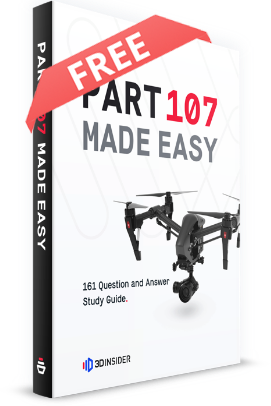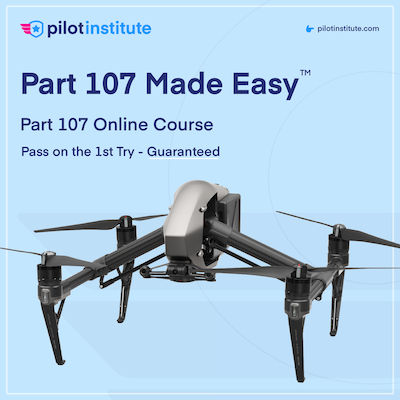How to Insure Your Drone
The landscape of the commercial drone industry has changed rapidly in the last couple of years. With commercial drone services getting more common, traditional business-related bureaucracy has started to set in. In addition to legal regulations especially enacted for commercial drone pilots, they are now also strongly advised to get some form of insurance policy related to their service. Why is this necessary? How do commercial drone pilots go about getting a policy? Read on and find out!
Do I need an insurance policy to offer my drone services?
Legally speaking, there is no requirement by the FAA or by any other government body that commercial drone pilots need to have an insurance policy. However, having insurance is a competitive advantage, and you probably will find it hard to get clients if your business is not insured.
Keep in mind that although there is no legal need for an insurance policy, you will still need to get a Part 107 drone license to be a commercial drone pilot. Being licensed means passing the Part 107 knowledge test and being pre-screened by the TSA. With a Part 107 license, you have proof that you adhere to the knowledge standards that the FAA requires of commercial drone pilots.
How is the Part 107 license relevant? It’s a necessary step if you are thinking about getting an insurance policy for your drone business. Insurance companies will want to know how good you are with your drone. After all, they are not likely to grant a policy to pilots who do not know what they are doing and will likely run into accidents. Before you consider getting a drone insurance policy, get the Part 107 license first.

PART 107 Made Easy
- 161 Question and Answer Study Guide
- 105 pages of illustrated content
- Covers all parts of the Part 107 test
- $97 of value for free
Why would I need an insurance policy?
The main purpose of any insurance policy is to protect you from unexpected financial obligations. If you lose or damage your drone or get into any accident, the insurance company can cover the damage and liability costs to an extent as defined by the policy. Think of it as a financial safety net for your drone-based business.
1. Drone damage
Being the central piece of technology to your business, you must have some protection against accidental damage of your drone. Even if you are a highly experienced drone pilot with no thrill-seeking behavior, accidents can happen both due to pilot error and mechanical failure. A professional-grade drone can cost up to $2000. Having to buy a new drone or to spend money on repairs can really affect your overhead costs.
2. Liability
More than just your drone, what you should really be worried about is the potential damage to property and personal harm that a drone-related accident can lead to. A drone may not weigh much, but a fall from 50 feet up can do some serious damage to a car or to the roof of a house. Even worse, the drone can crash on a person and lead to serious injury. The costs of repair, hospitalization, personal injury, and time lost can possibly be covered by your insurance policy, depending on the circumstances.
3. Payload
Depending on the job, your drone may need to do some heavy lifting. Drone mapping, agriculture surveys, or even just plain drone photography jobs can require your drone to carry additional equipment. Typically, sophisticated cameras and sensors can cost upwards of $2000. With the proper payload insurance policy, all of this extra equipment can be replaced or repaired in the event of an accident.
4. Other equipment
You will most likely have to rely on equipment and devices other than just your drone if you will be running a drone business. You will need tablets to see your drone’s live video feed, laptops or work stations to download data and edit videos, and various storage devices to store the drone’s data. These may seem like auxiliary devices, but they are still essential to the operations of your business. You may take out an insurance policy on all these devices to lessen the business impact should they be damaged.
What kind of drone insurance policies should I get?
1. Drone hull insurance
This policy covers the financial costs of any physical damage that may befall the drone. This includes the cost of any repairs, parts replacement, or outright replacement of the unit. For most insurance providers, the drone hull insurance is considered an add-on the to the base liability insurance. However, there are companies that specialize on drone hull insurance that will be more than happy to provide insurance service just for the drone.
If you are flying a DJI drone, then you have one of the best options available to you. DJI has an in-house drone hull insurance policy called “DJI Care Refresh”. This policy is available for all new drones, and DJI gives you the option to get the policy immediately within 48 hours of drone activation. For a yearly price, your drone can be covered by the DJI Care Refresh policy which states that DJI will cover all the costs and repair and parts replacement of your drone should it be damaged in an accident.
The best part about DJI Care Refresh comes through should your drone be damaged beyond repair. For a very small fraction of the drone’s purchase price, DJI will offer to replace your drone with a brand new or equivalent to brand new version. The policy covers water damage, but keep in mind that you recover your drone to make any claims.
If getting a DJI Care Refresh is not an option for you, then there are still other companies such as Avion Insurance and Travers & Associates who will be willing to provide you with a drone hull insurance policy. Take note that the policy coverage will be directly proportional to the market value of your drone. This means that a more expensive drone will also require a higher annual premium.
2. Liability insurance
For most insurance providers, liability insurance is often the base policy that they offer. Any other coverage, such as the drone hull or payload, are considered add-ons. Why is the insurance scheme set up this way? Simply put, the coverage of a liability insurance is bigger than any other drone-related insurance policy you can get.
Some people even forego getting drone hull insurance, especially if they are only using mid-range drones that cost $1000 or below. However, even pilots who use cheap drones are highly recommended to get liability insurance. If you think that drone accidents do not happen very frequently, then you just need to look at veritable databases and news reports to know that they are more common than you think.
Typical liability insurance policies start at a coverage of $500,000 and can even be negotiated as high as $10 million. These figures sound like overkill but certain drone applications have them flying over high value property, as in real estate advertisement. Flying over crowds in concerts and sports events can also result in multiple injuries should a drone crash. Drone crashes have even been known to start fires in some cases.
How much coverage you choose to apply for is really determined by the specific service that you offer, and the associated level of risk.
3. Payload Insurance
While it would be convenient to lump together the cost of the payload and the drone in a single insurance policy, it is often not a recommended practice. After all, there may be different types of payload that can be insured with different coverage values. This insurance is applied to equipment that can be removed from the main drone body, such as the Zenmuse X5S or Zenmuse XT2 specialty cameras.
Aside from the items covered, there really is not much of a difference between a drone hull insurance and a payload insurance. The insurance should cover the costs of repair and replacement of the unit should they be damaged in an accident.
4. Personal injury
A relatively new addition to the roster of insurance policies recommended for drone business, a personal injury insurance covers the damage that can be brought about by libel, slander, copyright infringement, or violation of privacy. Drone business owners are always in a precarious position of social acceptance. With this coverage, a drone business owner can protect the company from financial fallout that may result from unwarranted attacks on the reputation of the business.
5. Non-owned coverage
As a commercial drone pilot, you may be put into situations where you have to fly a third-party drone. Damage or injury claims in this type of situation can be covered by a non-owned coverage policy. A non-owned policy can also include liability, drone hull, and payload – basically a mirror version of all your existing policies applied to situations where you are not piloting your own drone.
6. Ground equipment
If you are working with an array of equipment on the ground such as receivers, tablets, remote controllers, and several laptops, it may be worth your while to have these ground equipment insured as well.
What is the process of getting a drone insurance policy?
Keep in mind that you will be applying for a drone insurance policy, and that the insurance company has all the rights to reject your application. This means that the burden is upon you to prove to them that you are not a high-risk client. The following list are some of the most relevant questions that you will need to answer for the insurance company.
- How much did you pay for your drone or your payload equipment? It will be better if you can provide receipts.
- How many years of experience have you had flying a drone?
- What drones have you had experience using? Is it the same drone that you will be insuring and using for your business?
- Have you attended any drone school or training course that focuses on safe drone flight practices? When did you take such training? If the training provides an assessment score via a written test or simulator course, then you can include those information
- Are you a member of any local drone community? How does this community emphasize the importance of flight safety? Does the community have initiatives to promote flight safety among its members?
- Have you registered your drone with the FAA?
- Have you earned a Part 107 drone license? What is your rating on the Part 107 knowledge test?
- Will you be the one piloting the drone? Will anyone else in your company be piloting the drone?
- How regularly do you pilot a drone?
- Do you keep flight logs of your drone operations? Do you have documents that support conducting pre-flight inspections regularly?
- What is the make and model of your drone? Does it come with any safety features such as obstacle avoidance, return to home, or intelligent power management?
- For what service will the drone be used? Will it be regularly flying over heavily populated areas?
- At what maximum altitude will the drone be flying up to?
- Where will the drone take off from and land to?
- Will the drone be used for competition or racing?
This is just a preliminary checklist of the basic information that you will need to prepare when applying for drone insurance. The insurance company may ask for other information that may be more focused on the nature of the drone service that you are offering. Your risk level based on the assessment of the insurance company will determine the coverage that you will be granted, the premiums that you will have to pay, and the deductibles of the policy.
How much should I expect to spend for a drone insurance policy?
Out of all the types of insurance policies, liability insurance will be far and way the most expensive. Most insurance companies peg the minimum liability coverage at $500,000, which corresponds to a yearly premium of roughly $600. If you think this coverage is too small, you can opt to settle for a $750 annual premium which provides coverage of up to $1 million. High-profile drone services can have insurance policies of up to $5 million in coverage, which costs around $2000 annual premium.
On-demand drone insurance companies such as SkyWatch and Verifly offer insurance at hourly rates, which may be more economical for small businesses. For as little as $5 to $10 per hour, you can be covered for up to $1 million in coverage. Best of all, applying for their insurance policies can be done in a mobile app, and can be approved in a matter of minutes.
The cost for drone hull insurance and other equipment insurance will depend entirely on the market value of your equipment or drone. For instance, the pricing scheme of the DJI Care Refresh plans is as follows:
| Model | Approx. market price | Policy price |
| Spark | $599 | $59 |
| Mavic Pro | $899 | $99 |
| Mavic Pro Platinum | $999 | $129 |
| Inspire 2 | $2999 | $299 |
| Phantom 4 Pro | $1799 | $149 |
| Phantom 3 SE | $495 | $59 |
| Zenmuse X4S | $829 | $59 |
| Zenmuse X5S | $1899 | $189 |
| Zenmuse X7 | $2665 | $499 |
The rates offered by DJI are extremely competitive compared to insurance companies since they have all the technical know-how to address the most common drone problems. They also have a very straightforward pricing scheme.
If you cannot take a DJI Care Refresh policy, then you can request for a quote from companies such as Coverdrone or Insure my drone. These companies will likely have to take into account your level of flight experience, the environment in which you will fly your drone, and the service that you will be offering. The process is a little more complicated, but it should all be worth it in the end.
Final thoughts
All the paperwork and documentation involved in running a commercial drone business sounds really bothersome, but it is a natural consequence of the progression of the industry. With so many commercial drone pilots running around offering their services, there needs to be a system of control and liability in place to keep them responsible and focused on safety.
That being said, accidents can and will happen. For drone business owners, a comprehensive insurance policy protects them from financial failure should these accidents result in costly damage to property or serious personal injuries. Getting insurance is definitely an added business cost, but it’s one of those things you would not want to be caught without when you get in a tight spot. With so many companies offering drone insurance services, there is no reason that any drone business should be operating without one.



Joseph, this is a great article!!
I have been trying to get in touch with you but I can’t find your contact info anywhere.
My name is Matt and I’m the owner of BWI, we are one of the largest drone insurance brokerages in the country and we work with AIG, Global Aerospace, Old Republic, USAIG, etc in offering 1 year annual insurance policies. We are also the preferred broker of AUVSI, you can see our link on their page here https://www.auvsi.org/resources/affinity-programs
I just wanted to let you know that I have connections all across the industry and with the top at AUVSI if you need any other data or references for other drone insurance articles.